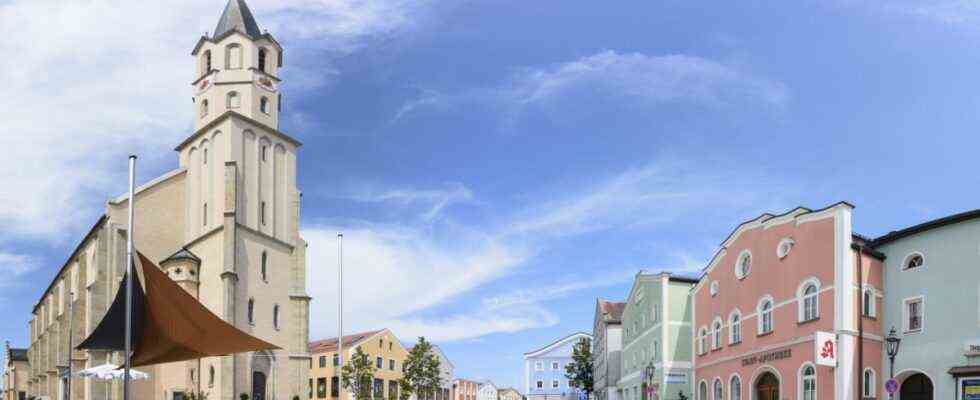Relocating authorities to rural regions is one of the most important structural policy instruments of the state government. It will stay that way until at least 2030. “The success story of the relocation of authorities will continue,” said Finance and Home Affairs Minister Albert Füracker (CSU) when he presented the new “Home Bavaria 2025 Offensive” in Munich on Thursday. “By 2030 we will have implemented 14 projects with around 2,670 jobs and 400 study places.” The Free State wants to be a role model for the economy. International companies should consider setting up second locations and offices in a different region, said Füracker, “this is more or less an invitation”. Sharp criticism came from the opposition. The head of the Rural Academy, Professor Manfred Miosga, warned that the efforts made so far must be intensified.
The aim of the home strategy is equal living and working conditions throughout the Free State. It has been running since 2014 and, from Füracker’s point of view, has worked completely. The main challenge of the past six years has been demographic change. “And the Free State has mastered that with success.” Füracker pointed out that the Bavarian population grew by 3.5 percent to 13.1 million people between 2014 and 2020. Even in the structurally weak regions in the north and east of Bavaria, the decline was much more moderate than predicted. In some cases, the population even rose again there. In addition, until the outbreak of the corona pandemic, almost full employment prevailed throughout Bavaria, with constantly increasing numbers of employees.
Füracker cited broadband expansion as an example of the fact that rural regions benefited particularly from the home strategy. In the meantime, 97 percent of households had high-speed Internet, and it was almost universally available. According to Füracker, digitization will not only remain one of the major tasks of the future due to the corona. “With our new gigabit funding, we are taking broadband expansion into a new dimension and are an absolute pioneer in Europe,” said the home minister. In addition, the Free State will step up its WiFi offensive for public spaces, universities, local public transport and around authorities.
The municipalities remain the central partner of the Free State in the home campaign. Füracker promised that the state government will continue to support the cities and municipalities in Bavaria as best it can. This applies above all to the municipal financial equalization system, which will reach a new record level of 10.44 billion euros in the coming year. Füracker is not just about municipal finances. He also wants to strengthen the citizens’ commitment to their communities – for example by offering home competitions or prizes. He also includes maintaining traditions and folk music. Füracker wants to pay particular attention to the border region with the Czech Republic, the districts there are still the weakest regions in the Free State.
The relocations of the authorities naturally extend across the entire Free State. In Upper Bavaria, parts of the district government are being relocated from Munich to Rosenheim and Ingolstadt. Parts of the building ministry move to Augsburg. Lower Bavaria has a property tax office in Zwiesel and Viechtach, the long-contested administrative court in Freyung and a branch office of Bayern Tourismus Marketing GmbH in Waldkirchen. The State Office for Finance is moving to Weiden in the Upper Palatinate. In Franconia, parts of the university for the public service (Kronach), a new logistics center for the police (Hof), further parts of the State Office for Health and Food Safety (Bad Kissingen), a processing center of the Munich Tax Office (Schweinfurt) and, as already known, some senates of the administrative court and parts of the public prosecutor’s office (Ansbach) established.
The head of the Landtag SPD, Florian von Brunn, went into court with Füracker sharply. “The minister produces beautiful headlines. He obviously copied that from Prime Minister Markus Söder,” said Brunn. “Without the rose-tinted CSU glasses, however, it looks much dreary. There is a lack of public transport in the country, the digitization of schools is lagging far behind and the shops are still dying.” Green parliamentary group leader Ludwig Hartmann accused the home minister of “Landlust-Marketing”. “Instead of distributing government jobs like alms, we have to get schools and hospitals, ensure medical care everywhere in Bavaria and create good public transport,” said Hartmann.
Academy boss Miosga agreed with Füracker that the overall very good economic development in Bavaria would also benefit the rural regions. Miosga called the relocation of authorities an “important signal for business to follow suit”. However, he pointed out that despite all efforts, in many places in rural areas it was not possible to retain young people. In addition, the conurbations benefited significantly more from the good economic conditions than the rural regions. In the border regions to the Czech Republic, many municipalities continued to shrink. Miosga’s conclusion: “Much remains to be done.”

